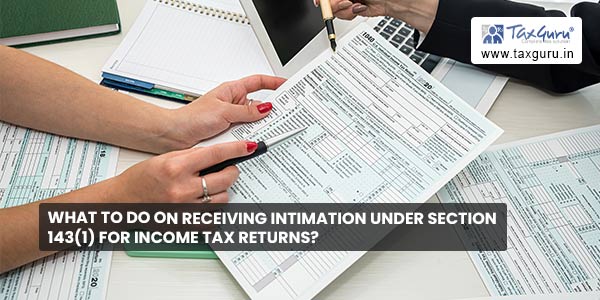Any person filing an income tax return would have received an intimation under Section 143(1) of the Income tax Act. This article tries to explain what is such an intimation and what a tax-payer should do once such an intimation is received?
An intimation under Section 143(1) of the Income tax Act, 1961 is the first step in processing of the income tax return.
This is also called as summary processing of return which is different from detailed scrutiny of return.
Under 143(1) intimation, the information submitted via returns is processed with reference to the return filed, tax audits filed, information available via Form 26AS etc. There may be summary adjustments to total income, disallowances, tax rates, set off and carry forward of losses, exemption sections, interest calculations etc.
Recently, the scope of processing and adjustment under 143 (1) has been enhanced and hence one should be careful when once receives an intimation under Section 143(1).
Please be careful to read the entire intimation order u/s 143(1) to check if you have received the entire refund or not, along with applicable interest.
For example, you may claim Rs. 85,000/- but the intimation may not allow certain tax credits because of an error in writing the TAN of the deductor. So you may get a lower refund of, lets say, Rs. 45000/-.
This difference in refund amount and reason for lower refund is not visible in the email but will be apparent once you read the entire intimation.
Further, other details, affecting not present year refund but may affect future year’s refund need to be checked.

For example, there are certain losses in present year or past year which would be carried forward in your return and may not have been reflected in the intimation order. The same needs to be rectified so that you can carry forward losses and set off against income in future year.
If the return is filed for a Company, then check the MAT calculation and credits in the intimation.
Conclusion: So read the entire intimation order carefully and if there is something which you do not agree,
i. first wait for the refund (if any ) already mentioned in that order and
ii. once you receive the same, file a rectification for the same.






EXCELLENT
Much more detailed discussion was needed. It is just a casual approach.
Dear Shah Sir, We respect your comments but we strongly disagree its a casual article or a casual approach to the subject. Any article or any subject can be enhanced. Please share your knowledge. We never claim to be perfect and we can always learn from you, Sir. But we again disagree that its a casual approach. Good day Sir.